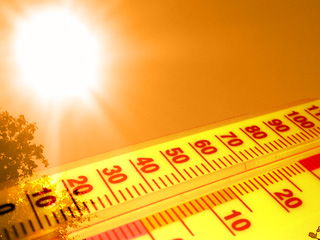
Heat and humidity are part of Kentucky’s summer weather landscape. Just having a way to relax and cool off is necessary to survive the heat.
The stifling heat and humidity makes being outside very uncomfortable for both people and animals alike. University of Kentucky’s Agricultural Meteorologist, Matt Dixon says that if you’re a fan of fall, you’re going to be disappointed as summer heat and humidity are likely to continue.
click to download audioThe UK Agricultural Weather Center developed the Livestock Heat Stress Index helps producers know when heat stress could create a problem for their animals. Dixon says periods of heat stress call for livestock producers to be vigilant in making sure their animals are able to withstand the conditions by taking precautions.
click to download audioOnce the temperature rises to around 90 degrees during the hot summer months, animals consume water at five times their dry matter intake. Changes occurring in animals as a result of heat stress include elevated body temperature, respiration rates, increased maintenance energy requirement, decreased milk production, and reproductive performance. Poultry are especially prone to heat stress and mortality during extreme heat can be significant.
click to download audioHeat stress accounts for about $370 million dollars worth of losses nationwide to our beef cattle industry every year, just due to the decreases in performance, decreases in fertility and the potential of mortality.






